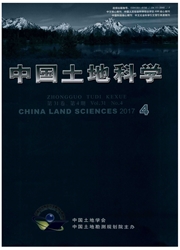

 中文摘要:
中文摘要:
研究目的:从国家、产权和契约的视角对土地股份合作制的效率进行经济学解读,探讨蕴含其中的理论价值和政策含义。研究方法:文献资料法,理论分析法。研究结果:国家要素的“失灵”导致了土地股份合作制效率出现“短板”;随着国家要素水平的降低,土地股份合作制迅速发展并产生较高绩效;而且,在国家要素的水平的阀值范围内,股份合作制才是农村土地制度改革最适模式。研究结论:采取放松政府管制、规范机制建设确保国家、产权和契约要素的协调运行,提高土地股份合作制的效率。
 英文摘要:
英文摘要:
The purpose of this paper is to analyze the efficiency of land stock cooperative system through economics perspective of state, property right and contract, which focuses on the theoretical meanings and policy implications. Methods employed include documentation and theoretical analysis. The results indicate: (1)the "malfunction" of state has caused the inefficiency of land stock cooperative system; (2)with the decreasing level of state factor, land stock cooperative system has been rapidly developed and shown comparatively good performance; (3)furthermore, within the threshold value range of state factor, the land stock cooperative system is the most suitable pattern of rural land system reform. It is concluded that measures such as relieving governmental regulations and standardizing the mechanism of land stock cooperative system can ensure the coordinated operation among the factors of state, property right and contract, and consequently improve the efficiency of land stock cooperative system.
 同期刊论文项目
同期刊论文项目
 同项目期刊论文
同项目期刊论文
 期刊信息
期刊信息
